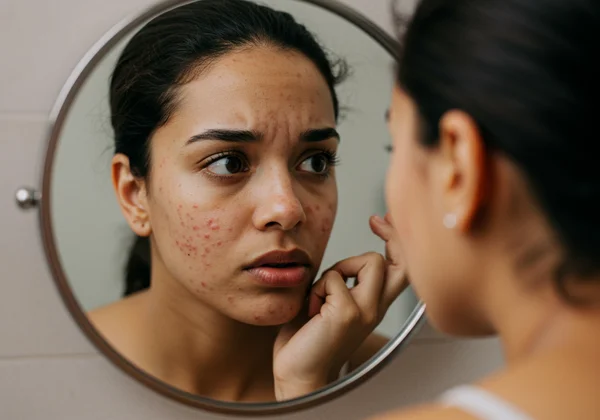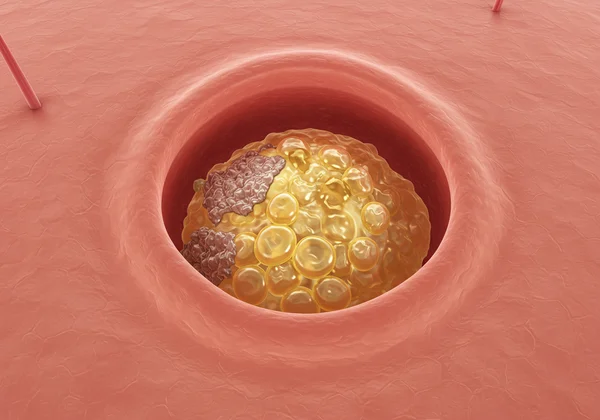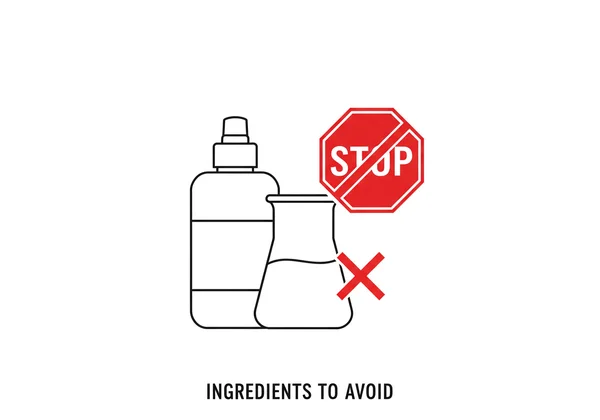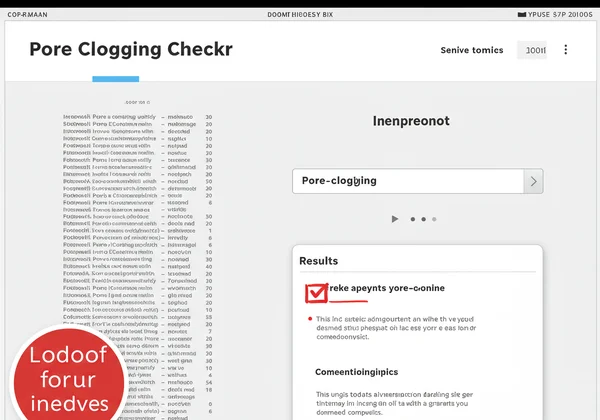Pore Clogging Checker for Cleansers: Your Guide to Acne-Safe Face Washes
Are you carefully following a skincare routine, only to be met with persistent breakouts and frustrating blemishes? Many of us have been there, investing time and money into products that promise clear skin but fail to deliver. The hidden culprit might be the very first step in your routine: your face wash. This guide will empower you to understand how cleansers can secretly contribute to clogged pores and teach you how to choose a truly non-comedogenic cleanser. How to check if a product is pore clogging? The answer lies in its ingredients, and we'll show you the simplest way to decode them.
Finding the right face wash is the foundation of a healthy skincare journey. It shouldn't be a game of chance. By learning what to avoid and what to look for, you can finally take control and select products that work with your skin, not against it. Ready to find the key to clearer skin? You can get an instant analysis of your current cleanser by using our free ingredient checker.

Why Your Face Wash Matters for Clear Skin
A cleanser's job seems simple: to wash away dirt, oil, and makeup. However, its impact on your skin's health is profound. The wrong formula can disrupt your skin's delicate balance, setting off a chain reaction that leads to clogged pores, blackheads, and inflamed acne. Choosing an effective acne safe face wash is not a luxury; it's a necessity for anyone prone to breakouts.
Understanding this crucial role is the first step toward building a routine that prevents acne before it even starts. It’s about more than just feeling "clean"; it’s about creating an environment where your skin can thrive.
The Link Between Cleansers and Clogged Pores
The connection between your cleanser and clogged pores can happen in two main ways. First, some cleansers, particularly creamy or oily ones, contain heavy emollients, oils, or waxes. While intended to moisturize, these ingredients can leave an invisible film on the skin. This residue can mix with dead skin cells and sebum, creating the perfect plug to block a pore, leading to comedones (blackheads and whiteheads).
Second, cleansers that are too harsh can strip the skin of its natural oils. This might feel satisfyingly "squeaky clean" at first, but it damages your skin's protective barrier. In response, your skin panics and overproduces oil to compensate, creating an even oilier environment that is highly susceptible to clogs and breakouts. Finding a balanced formula is therefore essential.

Understanding "Non-Comedogenic" Claims on Labels
You’ve likely seen the term "non-comedogenic" proudly displayed on many skincare products. It’s meant to signal that the product won't clog pores. However, this term is not regulated by the FDA. There are no standardized tests or universal ingredient blacklists that a brand must adhere to in order to use this claim. A product can contain known pore-clogging ingredients and still be labeled non-comedogenic.
This is why relying solely on marketing claims can be misleading. While it’s a good starting point, it is not a guarantee of safety for acne-prone skin. True confidence comes from looking past the front of the bottle and scrutinizing the complete ingredient list. Don't let marketing terms confuse you; analyze your cleanser to know for sure.
Key Ingredients to Avoid for Acne-Prone Skin
Navigating ingredient lists can feel like reading a foreign language. However, recognizing a few key offenders can make a world of difference. When searching for a cleanser for clogged pores, knowing what to avoid is just as important as knowing what to seek out. Some ingredients are well-known for their potential to cause breakouts in sensitive individuals.
Being an informed consumer empowers you to sidestep products that could sabotage your clear-skin goals. Let’s break down some of the most common culprits lurking in facial cleansers that you should be wary of.

Common Pore-Clogging Culprits in Cleansers
Many ingredients that give cleansers a rich, moisturizing feel are unfortunately highly comedogenic. These substances can directly block pores and should be approached with caution, especially if you have oily or acne-prone skin. While everyone's skin is different, certain ingredients are flagged more frequently than others in scientific literature and dermatological studies.
Here are a few common comedogenic ingredients to watch out for in your face wash:
- Coconut Oil: While popular in natural skincare, it is highly comedogenic for many people.
- Isopropyl Myristate: An emollient used to give products a smooth, sheer feel, but it has a high potential for clogging pores.
- Lauric Acid: A fatty acid that can be highly irritating and comedogenic.
- Cetyl Acetate / Acetylated Lanolin Alcohol: Derivatives of lanolin that are known pore-cloggers.
Hidden Aggressors: Sulfates and Harsh Surfactants
Beyond directly clogging ingredients, some components can create skin problems indirectly. Sulfates, such as Sodium Lauryl Sulfate (SLS) and Sodium Laureth Sulfate (SLES), are powerful detergents that create a satisfying lather. However, these harsh surfactants are notoriously stripping and can severely compromise the skin barrier.
When your skin barrier is damaged, it loses its ability to retain moisture and defend against external irritants. This can lead to increased sensitivity, redness, and the dreaded cycle of dehydration and excess oil production. This overproduction of oil is a primary driver of new breakouts, making these harsh cleansers a poor choice for long-term skin health.
How to Choose a Gentle & Acne-Safe Face Wash
Now that you know what to avoid, let's focus on the positive. Choosing the right cleanser is a proactive step towards clearer skin. The goal is to find a product that cleanses effectively without stripping or leaving behind a pore-clogging residue. This means looking for gentle cleansing agents and beneficial, skin-supporting ingredients.
The perfect acne safe face wash respects your skin's natural balance. It should leave your skin feeling soft, comfortable, and calm—not tight or dry. Focusing on gentle face wash ingredients will help you maintain a healthy complexion and prevent future breakouts.
Desirable Ingredients for a Healthy Skin Barrier
Instead of harsh detergents, look for cleansers formulated with ingredients that cleanse while supporting your skin's health. A strong skin barrier is your best defense against acne. Formulations that include hydrating and soothing compounds can make a significant difference in your skincare routine.
Look for these beneficial ingredients on the label:
- Glycerin: A powerful humectant that draws moisture into the skin, preventing dehydration during cleansing.
- Hyaluronic Acid: Can hold up to 1000 times its weight in water, providing excellent hydration.
- Ceramides: Lipids that are essential components of the skin barrier, helping to lock in moisture and protect the skin.
- Gentle Surfactants: Look for milder cleansing agents like Cocamidopropyl Betaine or Decyl Glucoside.
The Power of the PoreCloggingChecker Tool in Your Search
How can you be sure a cleanser is truly safe for your skin? The most reliable method is to check every single ingredient. Memorizing every potential pore-clogger is nearly impossible, and that's where our tool becomes your most trusted ally. The Pore Clogging Checker was designed to eliminate the guesswork.
Simply copy the full ingredient list from a product's website or packaging and paste it into the analysis box on our homepage. Our tool instantly scans the list against a comprehensive, science-backed database of known comedogenic ingredients. Within seconds, you'll see a clear result that highlights any potential culprits in red. This empowers you to make an informed, unbiased decision before you buy, saving you from potential breakouts and wasted money.

Empowering Your Routine: The Right Cleanser for Clearer Skin
Choosing the right facial cleanser is one of the most impactful decisions you can make for your skin. It’s the foundation upon which your entire routine is built. As we've seen, relying on marketing claims like "non-comedogenic" isn't enough. The secret to consistently clear skin lies in understanding the ingredients and avoiding those that are known to cause clogged pores and irritation.
By moving beyond the marketing and focusing on the science, you transform from a passive consumer into an empowered advocate for your own skin. Stop the cycle of trial and error. Take control of your skincare by analyzing your products with our free, unbiased tool. Unveil the hidden culprits in your routine and pave the way for the healthy, clear complexion you deserve.
Frequently Asked Questions About Non-Comedogenic Cleansers
How do I check if my cleanser is pore-clogging?
The most effective and easiest way is to use a dedicated pore clogging checker. Instead of trying to memorize hundreds of scientific ingredient names, you can simply copy the full ingredient list from your product and paste it into the analyzer on our site. Our tool provides an instant, easy-to-read report, highlighting any potentially problematic ingredients for you.
Are all non-comedogenic cleansers truly safe for acne-prone skin?
Unfortunately, no. The term "non-comedogenic" is not regulated, so its use on packaging is at the brand's discretion. A product can contain one or two ingredients known to be comedogenic and still carry this label. This is why personal verification with a reliable skincare ingredient checker is the best way to ensure a product is truly safe for your acne-prone skin.
What ingredients should I absolutely avoid in a face wash for acne?
While skin reactions can be very individual, some ingredients are frequently problematic for acne-prone skin. It's wise to be cautious of heavy oils like Coconut Oil, certain fatty acids like Lauric Acid, and emollients like Isopropyl Myristate. Additionally, harsh sulfates like Sodium Lauryl Sulfate (SLS) should be avoided as they can strip the skin and lead to more oil production.
Can a gentle cleanser really help prevent clogged pores?
Yes, absolutely. A gentle, pH-balanced cleanser is crucial for preventing clogged pores. It effectively removes dirt and excess oil without stripping the skin's protective barrier. By keeping this barrier healthy and intact, a gentle cleanser helps prevent the cycle of dehydration and rebound oiliness that often leads to clogged pores and breakouts.